| Srl | Item |
| 1 |
ID:
110834
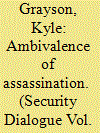

|
|
|
|
|
| Publication |
2012.
|
| Summary/Abstract |
This article begins by presenting a biopolitical account of assassination and targeted killing events carried out by liberal regimes. It argues that forms of political violence are understood and made meaningful beyond the administrative frameworks and technical rationalizations often privileged in biopolitical analyses. Deploying Alan Feldman's (1991) argument that political violence is an 'emplotted action' alongside William Connolly's (2005) notion of resonance, it provides a genealogical account of how forms of assassination have been positioned within Western cultural understandings of political violence. The focal point of examination is the biblical heroine Judith, whose story has resonated as a preferred narrative structure for understanding and (de)legitimating acts of assassination among Western publics. Through its reading of the book of Judith, the article highlights the importance of ambivalence for understanding assassination as a form of political violence. The legacy of the moral problematique enabled by Judith is then illustrated in relation to US President Barak Obama's May 2011 speech announcing the killing of Osama Bin Laden. The article concludes by suggesting that although the story of Judith may underpin contemporary assassination practices, it also offers a means of critically engaging with them.
|
|
|
|
|
|
|
|
|
|
|
|
|
|
|
|
| 2 |
ID:
100474
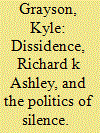

|
|
|
|
|
| Publication |
2010.
|
| Summary/Abstract |
Within the academy we are taught to look for silence - as a noun. We are counselled to find gaps in the literature or empirical case studies that have yet to be researched in order to bring our own voice to the issues that they raise. But, there is a tension with the other face of silence, when it assumes the form of a verb. Silence and silencing have therefore been integral motivators for the entire spectrum of 'critical' literature within international studies, not only to show what cannot be spoken or thought about within international studies but also, at times, how this can be a deliberate political practice. But there remains a hope. The hope is that the catalyst for transformation - not merely change - is within that which we already know and that which we already have the ability to articulate or to speak. But should we take these assumptions for granted? It is at this precise point where the concerns of Richard K. Ashley with dissidence can combine with the conceptual provocations of the case of the Pirahã people of western Amazonia to generate some uncertainty about the revelations that 'critical' scholarship often wants to provide.
|
|
|
|
|
|
|
|
|
|
|
|
|
|
|
|
| 3 |
ID:
083060
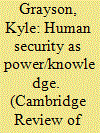

|
|
|
|
|
| Publication |
2008.
|
| Summary/Abstract |
This article interrogates the parameters of the human security debate as a site of biopolitics in order to gain an understanding of how it has been possible to shape the debate in certain ways and not others. The role of cosmological realism in grounding knowledge claims within the debate is explored. By privileging objectivist claims to knowledge of human (in)security, it is argued that empiricism and rationalism, as forms of cosmological realism, foster the production of logics which facilitate forms of biopolitical intervention. The quest for precision, measurement, causality and policy relevance that define the production of human security knowledge is shown to have important political effects beyond the definitional debate itself in terms of agency, normalcy, and the scope for intervention. Therefore, this article demonstrates how the demarcation of human security as a field of knowledge is a process pregnant with relations of power that are important to understanding contemporary political dynamics
|
|
|
|
|
|
|
|
|
|
|
|
|
|
|
|
| 4 |
ID:
098850
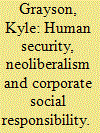

|
|
|
|
|
| Publication |
2010.
|
| Summary/Abstract |
Mainstream critiques of human security theory and practice have criticized how human security is being conceptualized, with a specific focus on how the absence of a precise and universally accepted definition hinders its practical application. Rejecting these critiques as an explanation for the policy failures of human security agendas, this article argues that the difficulties experienced in operationalizing human security lie in the myriad ways human security policies have revealed themselves to be subordinate to an existing, well-established and equally diffuse policy agenda: neoliberalism. The specific case study examines Canada, a prominent member of the human security vanguard, and its unwillingness to regulate transnational corporate conduct that contributes to human insecurity.
|
|
|
|
|
|
|
|
|
|
|
|
|
|
|
|
| 5 |
ID:
074350
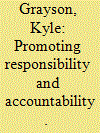

|
|
|